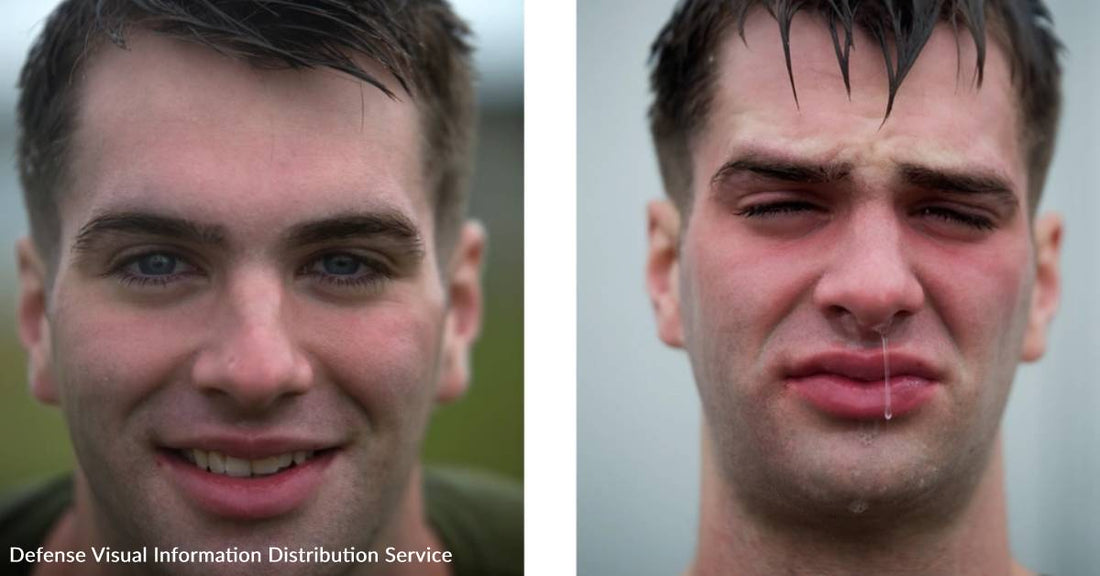Before-and-After Portraits Show The Painful Reality of OC Spray Training
Dan Doyle
When I told my dad in January of 1966 that I had signed up for the Navy, he looked at me and said, “Are you crazy? Don’t you know there is a war going on?" I told him, “Yeah, but I signed up to be a Hospital Corpsman. If I go to Vietnam, I’ll be on some ship way off shore.”
Little did I know that I would spend almost three of my four years wearing Marine Corps uniforms or that I would serve in Vietnam with Recon Marines in the bloodiest year of that war, 1968. Once my dad had gotten his wits back under control, he told me, “I will give you one piece of advice. Never volunteer for anything!”
The Marines in this article apparently didn’t get that advice. A handful of them, who are soon to graduate from Marine Corps Embassy Security Group School, volunteered to participate in an on-going effort to understand the effects of OC spray (Oleoresin Capsicum), or what we used to call in my day “tear gas,” on individuals. OC is a tool used in select training scenarios to understand the psychological and physiological effects the chemical agent has on a person. These Marines agreed to having before and after portraits made of them in the test.
You know the old phrase, “A picture is worth a thousand words.” Well these portraits speak volumes. OC is used most often for non-lethal crowd control in escalating circumstances. Marine Embassy Guards may be required to use OC in some of the embassy locations where they may be stationed, so it is important to know its effects, because they might find themselves in circumstances where they may have to deploy this tool and then be able to still function.
These Marine volunteers stood in formation in front of instructors, who each held a canister of OC. They were told to keep their arms at their sides and their eyes shut tight. Then they heard the order, “OC! OC! OC!” and they took a blast of it to the face. Then they heard the instructors saying things like, “How many fingers am I holding up?” Yeah, right! Open those eyes and the sting is almost unbearable, and the tear ducts start flowing like Niagara Falls.
They were then ordered to perform a series of non-lethal takedown and detainment exercises that they had been taught during their embassy training course. They had to do all of this while their faces felt like they were on fire and their eyes were stinging from the OC. They were then hosed down. Fresh, cold water never felt better, I’m sure, but it does not relieve all of the misery. Most of us who have served have had a similar experience.
I can remember being in training at Camp Lejeune’s Field Medical Service School in 1967. The training school was designed to be like Marine Corps boot camp and a serious combat medical training school. One day we were taken to a concrete block building in the woods. We were given gas masks and sent inside the building. When we were all inside, we heard, “Gas! Gas! Gas!” and we immediately put on our gas masks and made sure they were sealed correctly.
Then came the big surprise. We were told to remove the masks. Immediately, the coughing, wheezing, and choking commenced. Our eyes and our noses began running like broken faucets, and we were then told to exit the building. We exited that building, desperate for fresh air, slobbering and hacking, seeking water to clear our eyes and throats of the noxious gas. It was not a pretty sight!
Well, these volunteer Marine Corps Embassy Guard graduates now have a real up-close-and-personal understanding of the effects. Their portraits are there to tell the story. Bravo Zulu, Marines.
https://www.youtube.com/watch?v=7a6eWVV_eXk





